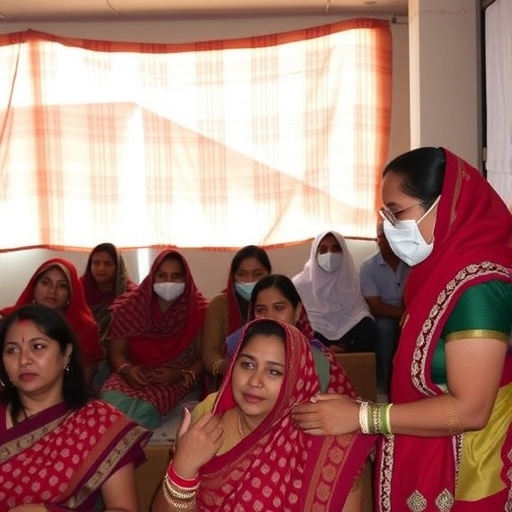In the remote and rugged terrains of Karnali, Nepal, a remarkable initiative is taking shape that seeks to confront centuries-old traditions rooted in menstrual taboos, notably the practice of Chhaupadi. This tradition entails the exclusion of menstruating women from their homes, forcing them into makeshift huts during their cycles as a misguided form of purification. The rigorous lifestyle in this region, compounded by deeply ingrained cultural norms, only exacerbates the challenges surrounding women’s health and social equity. Recent studies are shedding light on how community health nurses play a pivotal role in confronting this issue through targeted educational interventions designed for both men and women in these communities.
The research spearheaded by Ghimire and Neupane emphasizes the urgent need for social change. By equipping community health nurses with specialized training in health education, the project aims at fostering awareness about the adverse effects of such practices. The researchers argue that education is paramount in dismantling the societal structures that perpetuate Chhaupadi. They advocate for a dual approach, addressing both the misinformation surrounding menstrual health and the broader implications of gender inequality that allow such practices to thrive.
These interventions are not merely academic exercises; they consist of practical strategies designed to engage local populations. Ghimire and Neupane illustrate that by integrating community health workers into schools and local centers, these nurses can establish trust and rapport with residents, facilitating honest discussions about menstrual health. This grassroots approach offers the hope of gradual attitudinal shifts, which are crucial in eradicating harmful traditions that have prevailed for generations.
One of the significant revelations of this research is the identification of critical cultural narratives that sustain the Chhaupadi practice. The study indicates that addressing the myths associated with menstruation is essential. Many people in Karnali believe that menstruating women are ‘impure’ and should not engage in household activities or touch sacred items. Through guided education led by health professionals, individuals can begin to question these inherited beliefs.
Furthermore, the emotional and psychological implications of Chhaupadi on women’s health cannot be overstated. Women are often subjected to social isolation during their menstrual cycles, which can lead to feelings of shame and unworthiness. The research highlights that community health nurses can help in building a narrative around menstrual health that embraces openness, normalcy, and acceptance. By normalizing menstruation, these nurses contribute to the empowerment of women and help alleviate the stigma that isolates them during their cycles.
The study also emphasizes collaboration with local religious and community leaders. By actively involving these influential figures in the conversation about menstrual health and Chhaupadi, the initiative can pave the way for broader acceptance and understanding within the community. This collaboration is crucial as it leverages existing power structures to facilitate dialogue and encourage behavioral changes.
Moreover, the project aims to develop culturally-sensitive educational materials tailored to the needs of the local population. These materials will address specific beliefs and myths tied to menstruation, with visuals and narratives that resonate with community members. By using locally-relevant examples and engaging stories, education can transform the conversation around Chhaupadi into one of empowerment rather than exclusion.
The study also points towards the importance of data collection in measuring the effectiveness of these interventions. Through surveys and interviews, community health nurses can assess the attitudes and behaviors of residents before and after education sessions. This data would not only provide insights into the reach of the program but also help refine future educational efforts.
The project’s long-term vision entails creating a sustainable model for menstrual health education that can be replicated in other regions of Nepal and beyond. By embedding this model within the existing healthcare framework, it could potentially lead to systemic changes that improve women’s rights and health. Such a transformation calls for the commitment of governmental and non-governmental organizations to support health workers and advocate for policies that favor gender equity.
As more women become empowered to speak up about their experiences concerning Chhaupadi and menstrual health, there exists a palpable hope for change. Women who feel supported by their communities will be more likely to embrace their health needs and strive for equity within social structures. The reach of this initiative can potentially ripple beyond Karnali, inspiring similar movements across different parts of the world facing analogous issues.
Significantly, this research is part of a larger global discourse regarding menstrual health management and women’s rights. As the conversation surrounding menstrual hygiene grows in scope and depth, findings like those from Ghimire and Neupane will serve as invaluable blueprints for future interventions. Addressing gender disparities is not solely a local issue; it requires global collaboration and commitment.
In conclusion, Ghimire and Neupane’s research sheds light on a vital issue that demands urgent attention and innovative solutions through community health nursing. Their findings reiterate the need for educational interventions that empower communities to eradicate harmful practices like Chhaupadi. As this project unfolds in Karnali, it will undoubtedly contribute to a broader movement advocating for equity, inclusiveness, and the health rights of women everywhere.
Subject of Research: Community health initiatives addressing Chhaupadi and menstrual health in Karnali, Nepal.
Article Title: Educating for equity, navigating reality: community health nurses implementing interventions to eradicate Chhaupadi in Karnali, Nepal.
Article References:
Ghimire, A., Neupane, M. Educating for equity, navigating reality: community health nurses implementing interventions to eradicate Chhaupadi in Karnali, Nepal. BMC Nurs 24, 1368 (2025). https://doi.org/10.1186/s12912-025-04012-w
Image Credits: AI Generated
DOI: https://doi.org/10.1186/s12912-025-04012-w
Keywords: Chhaupadi, community health nursing, menstrual health, gender equity, health education, cultural practices, Nepal.
Tags: addressing misinformation on menstruationcombatting Chhaupadi traditioncommunity health nursescommunity-based health interventionscultural norms and women’s healthempowering women in rural areasgender inequality and healthKarnali region health initiativesmenstrual health educationsocial change in Nepaltackling menstrual taboostargeted educational programs





